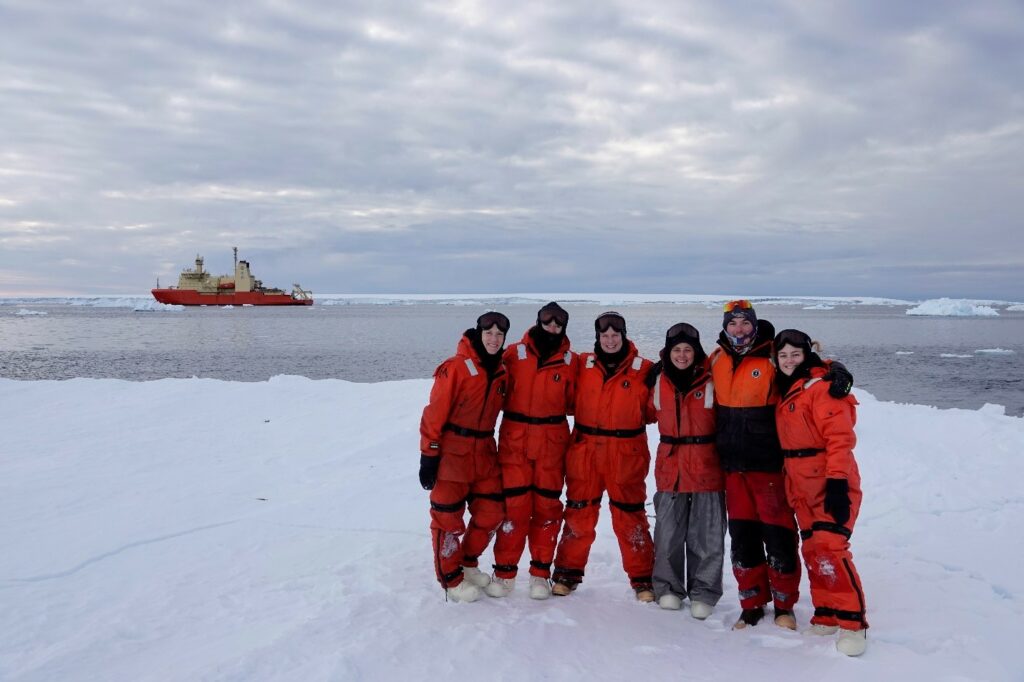
The 2023 Penguin Team just departed the National Science Foundation’s R/V Nathaniel B. Palmer after finishing up a productive field season in and around the Ross Sea, Antarctica. We interviewed each member to learn a bit more about them!
Gitte McDonald
Associate Professor, Moss Landing Marine Labs at San Jose State University
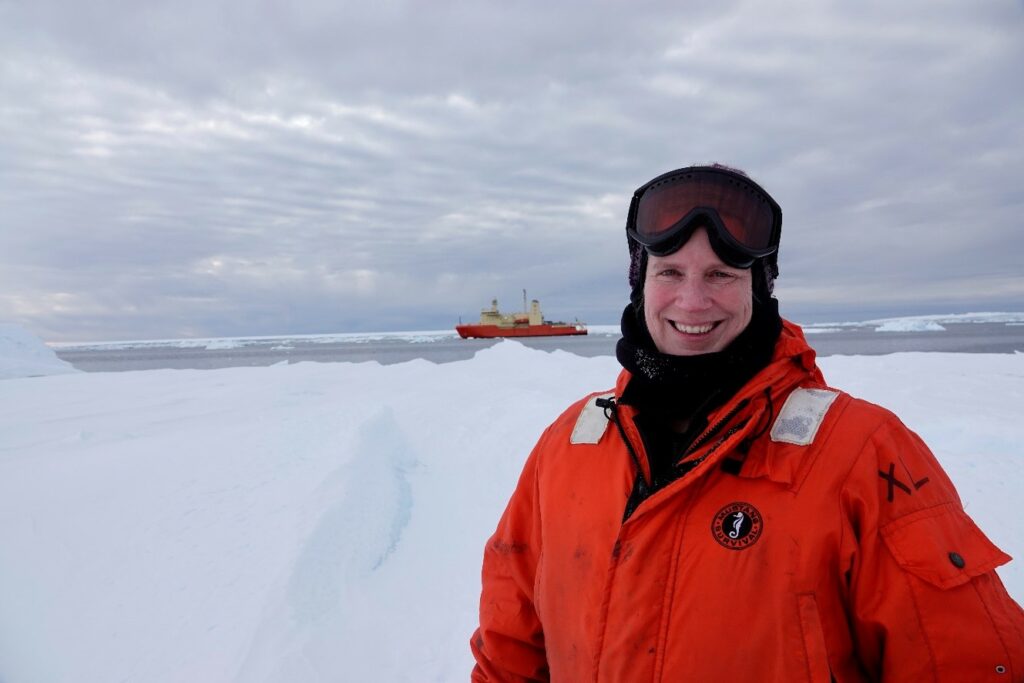
What do you think is the most interesting thing about emperor penguins?
“I am amazed by emperor penguin physiology! They are a species of extremes. They are the premier avian diver performing dives to depths over 500m for over 20 minutes. They also have an amazing ability to fast. During the winter males will fast over 100 days during courtship and incubation.”
What is one of your favorite memories from conducting field work?
“It was fun to think back on field seasons and surprisingly hard to settle on a favorite story or season. Because we are currently in Antarctica studying emperor penguins, I have been thinking a lot about my first season working with emperor penguins at Cape Washington, so I will go with that. We traveled to Cape Washington to study the diving physiology and ecology of emperor penguins. The day we arrived; we were greeted by a welcoming committee of penguins within the hour. It was amazing to be camping on sea ice 2 km from one of the world’s largest emperor penguin colonies and being lulled to sleep by the hum of the colony. Later in the season we could even hear seals singing under the ice we were sleeping on. We were at Cape Washington for 6 weeks where we spent hours near the colony and at the ice edge each day observing the penguins. These hours of observations have inspired some of the questions we are currently pursuing, or I hope to pursue in the future.
One of my favorite days of the season was a bonus day. Because of the amount of gear we have, it takes 2 days to close camp (two flights each day). We sent off half our gear during the first day. On the 2nd day we confirmed that two more flights were heading our way so we continued to break down camp. About an hour before we were expecting the first flight to arrive, we got a message that the plane was not coming. We had to go back to the temporary runway to get enough camp gear to make it another day or two and spent half the day setting up camp again. The next day was a beautiful snowy day, so no flights were coming. We made the most of it by heading out to the ice edge to get in a last day of observations. There was so much activity that day. We saw 100 killer whales swim by, 100’s of chicks were jumping into the water for the first time, and we also saw a leopard seal. While we were initially disappointed by your delayed departure, the amazing day at the ice edge more than made up for it. The following day we had better weather and the flights came in to take us home.”
Caitie Kroeger
Post-doctoral Researcher, Moss Landing Marine Labs at San Jose State University
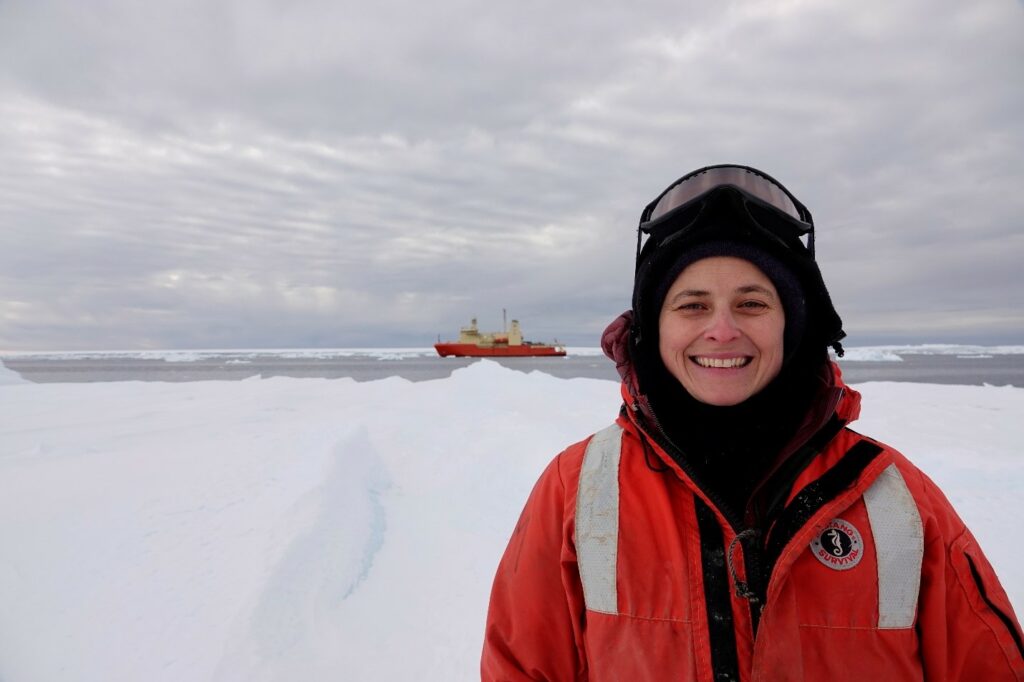
What do you think is the most interesting thing about emperor penguins?
“I'm always so amazed when I think about how male emperor penguins fast for 2 months while incubating the egg their mate has laid - in extreme cold weather to boot!”
What is one of your favorite memories from conducting field work?
“One of my favorite field work memories was having a very curious emperor penguin (affectionately named "Petey" by our crew) silently follow me from our field camp at Cape Crozier to a nearby site where I was listening for radio tagged birds with an antenna receiver. I didn't know I'd been followed and turned around to walk back to camp and almost bumped right into him! I let out a startled gasp (he just looked confused), then gave him a nod and walked back to camp with him following close behind. It felt like we had a pet penguin in camp for most of the month as he'd make regular appearances to yell at us from outside our tents and follow us around from one tent to another.”
Taylor Azizeh
Master’s Student, Moss Landing Marine Labs at San Jose State University
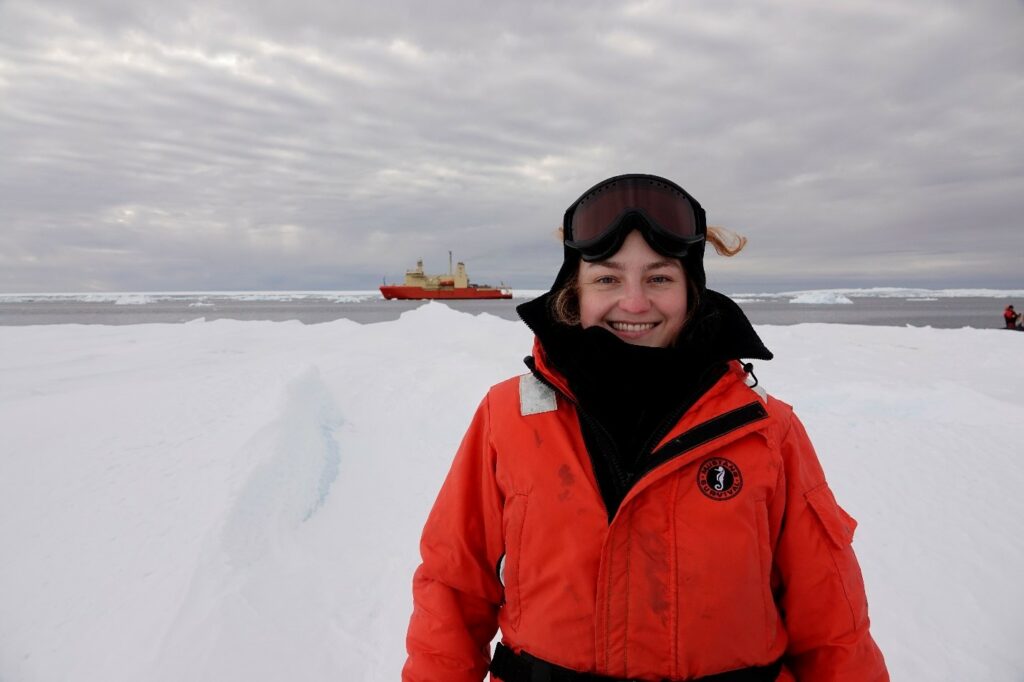
What do you think is the most interesting thing about emperor penguins?
“Scientifically, I think one of the most interesting things about emperor penguins are their adaptations to extremes! Everything about them is perfectly designed to live and thrive in one of the harshest environments on the planet. They dive really deep, fast for months, raise chicks in ice and snow, and forage in incredibly cold waters. It’s really exciting to take part in gaining new information about them to learn even more about their life history!
Un-scientifically, I think it’s amazing how curious they are about humans. They would often come and greet us as we pulled up to the ice, even walking right next to us while we were working. And a bonus - their feet always seem to be warm, even when they’re covered in snow and ice!”
What is one of your favorite memories from conducting field work?
“Outside of this experience, one of my favorite memories from the field was getting to work in the Andes, catching bats. We would sit next to the mist-nets for hours, nestled in the trees, listening to the night sounds, and looking at stars. I was so surprised to learn that even the smallest bats make noises that are so loud, you can hear them without needing a microphone.
On this trip, one experience stands out in which we were working on some fast ice with one very chunky Weddell seal and plenty of emperor penguins. We had to actively avoid getting too close to the seal or tripping over it, because it was fast asleep and completely unaware of us.”
Sarah Peterson
Wildlife Biologist & Guest Researcher, UC Santa Cruz Institute of Marine Sciences
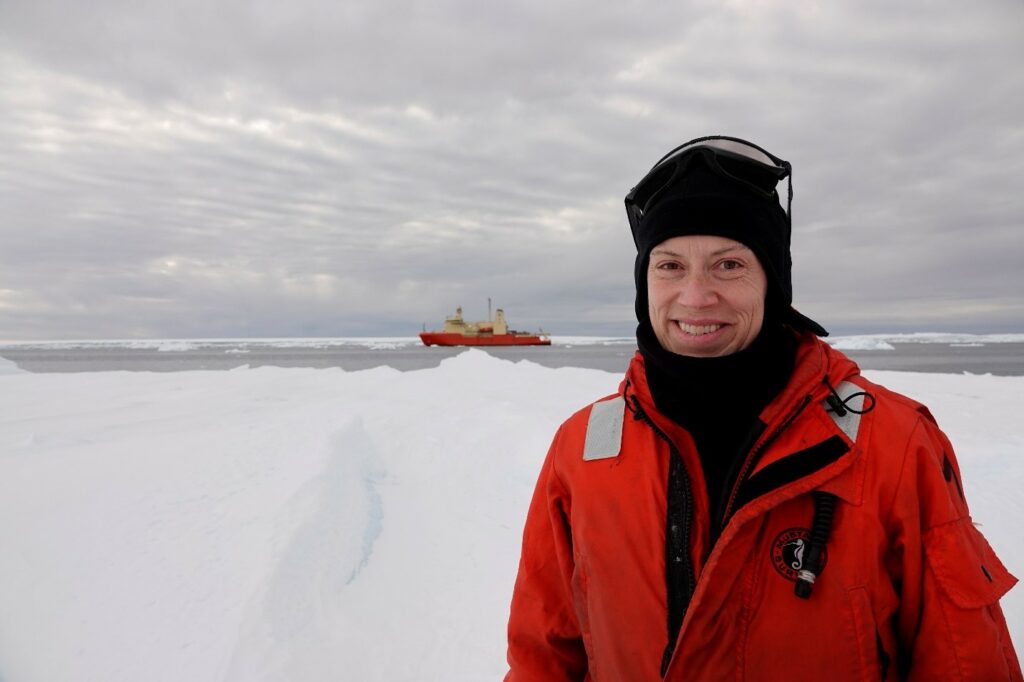
What do you think is the most interesting thing about emperor penguins?
“I think that the deep diving capabilities and similarity to marine mammals (being a bird!) is one of the things that I find most fascinating about emperor penguins. I guess I'm drawn to some of the animals that do things to the extreme (elephant seals and emperor penguins as the two species that most exemplify that).”
What is one of your favorite memories from conducting field work?
“I think that my favorite field work memory (other than coming to Antarctica for this penguin project) was getting the opportunity to spend almost a year in Yellowstone National Park working for the Yellowstone wolf project to track and observe wolves with a significant focus on prey selection and hunting success during the winter season.
Not surprisingly that experience prepared me well to field work in Antarctica, as we primarily sat out in the weather up on snowy ridge tops from first light to last light, trying to get as much time as possible each day watching a wolf pack hunt and document their behavior throughout the day. Reintroduction of wolves to Yellowstone NP in my opinion is one of the greatest conservation success stories and to be a part of it was incredible, especially the few times I had an unexpected relatively close encounter with wolves. Once with a wolf that ended up walking past me close enough that I could see it's yellow green eyes and the second with a group of wolf puppies yipping and playing just below us on a thickly wooded hillside near their den that we had not yet pinpointed.”
Meredith Meyer
PhD Candidate, The University of North Carolina at Chapel Hill
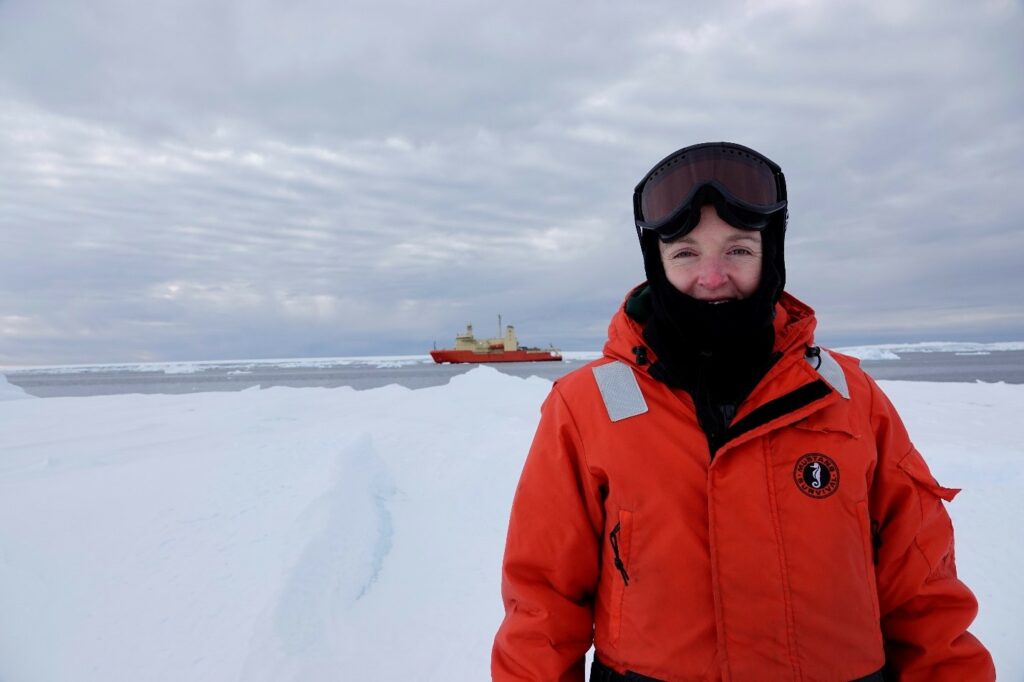
What do you think is the most interesting thing about emperor penguins?
“The thing I find the most interesting about is that emperor penguins heart rate changes so dramatically over a short period of time when they are diving! Humans would never be able to do that!”
What is one of your favorite memories from conducting field work?
“My favorite field work memory is seeing the first glimpse of the ice and mountains of Antarctica as our C-130 plane came within reach of the continent.”
Wyatt Jobe
Field Safety Coordinator, Amentum
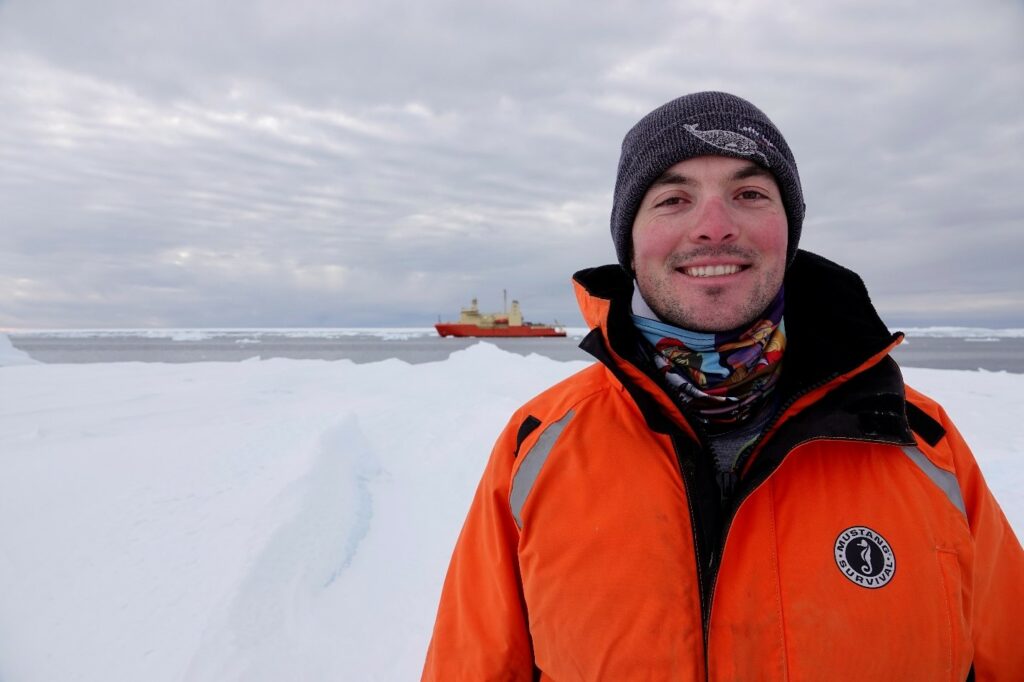
What do you think is the most interesting thing about emperor penguins?
“I find how agile they are in the water to be really incredible. They really do swim quite fast and can dive up to 6 minutes.”
What is one of your favorite memories from conducting field work?
“My favorite memory was after gently releasing a bird we had just tagged, unlike every other bird, this one decided to turn around and slap me in frustration. Then proceeded to posture and make itself look larger while I was standing back up

